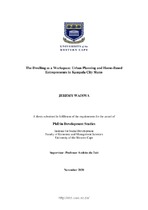| dc.description.abstract | The ubiquitous urban informality that characterises the cityscape of most sub-Saharan cities, has been impacted by states’ rationalised urban planning interventions to make urban spaces, and the activities of citizens more legible and governable. This study aimed at understanding the effects of urban planning and the regulatory environment on the business operations of the home-based entrepreneurial households and the strategies employed by these households to ensure their livelihood survival. The study used Katanga slum in Kampala, Uganda as a case study. The study approaches urban planning as a dialectical process, and therefore critically discusses the production and use of space (through urban planning) at different spatial scales of the city, slum and household, while highlighting the challenges experienced by the households and how they cope with these challenges. To facilitate the understanding of these issues, the study employed an integrated theoretical framework that comprised of Lefebvre’s theory of the production of space, Scott’s concept of state legibility, Jalan & Ravallion’s concept of urban spatial poverty traps, and Clark’s border theory. | en_US |

